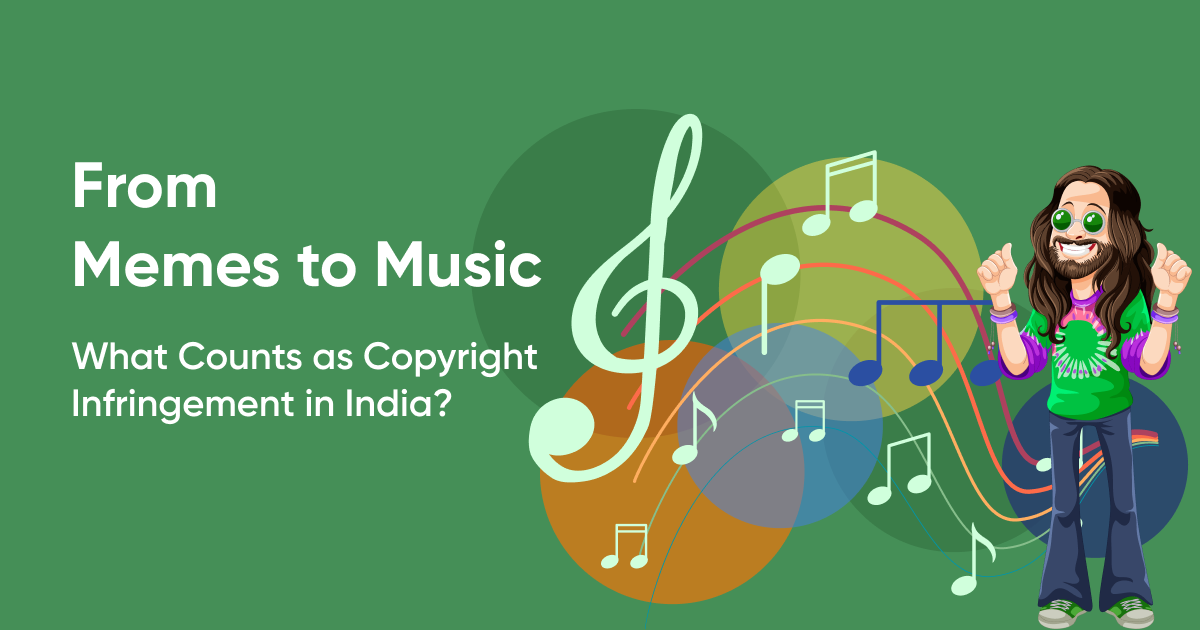Copyright protects original work like music, films, art, and software. It gives creators legal control over how their work is used. A trademark right protects logos or brand names, but not creative content. These are two separate legal rights under intellectual property law. A brand owner may not be the copyright holder unless they created or purchased the rights to the content. The Copyright Act, 1957, in India helps creators protect their work from unauthorized use. It gives them control to share or publish.
Infringement happens when someone uses that work without permission, even for a few seconds or for non-commercial reasons. As digital tools grow, copying and sharing online is easier than ever before. But that ease brings legal risks. Social media users often remix or post content without knowing the rules. This can lead to legal trouble. Even short clips, if used wrongly, can result in penalties or takedown notices. Copyright law applies to all digital work.
Meme Culture and Copyright Risk
Memes often include viral videos, movie scenes, or song lines, all of which may be copyrighted by someone else. Though funny or harmless in nature, memes can still violate copyright law if the material is used without permission.
In 2023, T-Series sent legal notices to meme pages on Instagram. These pages had used Bollywood music in promotional content. They used short clips to attract likes or advertise products. That counted as commercial use without permission. In India, we follow the “fair dealing” rule, not “fair use” like in the United States. Fair dealing allows limited use of copyrighted work for education, news, or criticism. But not for promotions or memes. Courts look at how much was used, why it was used, and if it hurt the original creator’s profits. If a meme copies a major portion or affects the market, it could lead to a lawsuit or takedown.
Music Use and Legal Boundaries
Music is the most common type of content misused online. People often add songs to reels, shorts, or videos. But using copyrighted songs without a license, even briefly, can lead to copyright claims or lawsuits.
In 2022, Sony Music sued DJ Aqeel Ali for remixing and playing Bollywood songs without a proper license. The label said the remixes caused financial loss and broke copyright law. They asked for damages in court. Even background music in a business video or brand campaign must be licensed properly. Creators often think short clips are safe, but they are not. All content must be legally cleared. YouTube has free music libraries, but users still need to read the terms and conditions. Indian law protects the creator's right to control how their work is used and credited.
Even using short music clips in monetized videos, brand promotions, or livestreams can trigger copyright claims. Content creators must license music appropriately, especially for commercial purposes. Platforms like YouTube offer copyright-free music libraries, but users must review licensing terms to avoid violations. Indian courts uphold both the economic and moral rights of music creators, which include the right to control adaptation and attribution. Ignoring these rights can have legal consequences.
Reels, Shorts, and the Legal Grey Zones
The rise of Instagram Reels, YouTube Shorts, and similar platforms has made it easy to reuse audio and video clips. But with convenience comes legal risk.
In 2022, music label Zee Music filed copyright complaints against creators using unlicensed songs on YouTube Shorts for brand tie-ups and influencer campaigns. Such usage was deemed commercial exploitation without proper licensing. Another notable case involved Viacom18 issuing copyright takedown notices for reality show footage reused in fan edits and reaction videos.
Public sharing of movies, songs, or TV clips, even if done by individuals for entertainment, can constitute infringement. India’s laws treat unauthorized sharing on public platforms equally for individuals and businesses.
GST and Copyright Licensing: The Financial Implications
The Goods and Services Tax (GST) has added another layer of complexity to copyright compliance. Licensing intellectual property (IP) rights for commercial use is taxable under GST at 18%. This means content creators, agencies, and platforms must factor in this tax when acquiring rights to use music, videos, or other copyrighted materials. The increased cost has raised compliance challenges and discouraged smaller creators from seeking proper licenses. Failing to license content properly not only risks legal action but also invites tax non-compliance penalties under Indian GST law.
Copyright Infringement and Legal Consequences
India enforces copyright laws through both civil and criminal remedies. Civil damages vary based on the scale of harm, but criminal action is addressed under:
- Section 63 of the Copyright Act prescribes imprisonment for up to three years and/or fines for knowingly infringing copyrighted work.
- Section 65 penalizes anyone who knowingly uses or possesses infringing copies, including digital files or media.
With increased digital monitoring, platforms like YouTube and Instagram deploy automated content recognition systems to detect copyrighted materials. However, manual enforcement by rights holders remains vital, and legal teams actively track and act against unauthorized usage across platforms.
Stay Creative, Stay Legal With Trademarkia Support
Copyright laws apply to all forms of digital content, from memes to remixes. Claiming ignorance is not a valid defense under Indian law. Whether you're a content creator, influencer, marketer, or business, you must respect ownership and obtain proper licenses when required.
In a rapidly digitizing landscape, combining creativity with legal compliance is the only sustainable path. Avoid costly legal consequences, embrace ethical creation, and stay informed about India's copyright framework on Trademarkia India. With Trademarkia legal experts, companies can protect their copyrights and secure their creativity.

